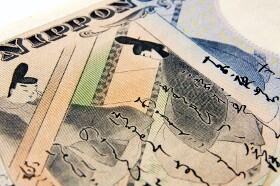
The Japanese yen is strengthening against multiple currency pairs midweek, driven by better-than-expected banking lending and manufacturing prices. Will this be enough to quash concerns about a possible recession? After last weekâs surprise decline in machinery orders, it is unclear where the Japanese economy is heading.
The producer price index (PPI), a measurement of the average movement in selling prices from domestic production, climbed 1.1% in October, up from 0% in September. The performance in October is higher than the market forecast of 1%. Year-on-year, the PPI is still down 0.4%, according to the Bank of Japan (BOJ).
On Tuesday, the Japan Machine Tool Buildersâ Association (JMTBA) reported that machine tool orders plunged 37.4% in October, below the median estimate of -30%. This comes soon after September machinery orders were reported to have tumbled 2.9%, falling short of the expected 1.1% gain.
Because of accommodative monetary policy and negative interest rates, bank lending appears to be on the rise in Tokyo. The BOJ found that the value of loans advanced 2% in October compared to the same time a year ago.
Will this be enough to restore confidence in the worldâs third-largest economy? The federal governmentâs Economy Watchers Survey in October clocked in at 36.7, down from 46.7 in the previous month.
The next big piece of data will be the third-quarter gross domestic product (GDP), which is scheduled for release on Thursday. Analysts are projecting Q3 GDP growth will have slowed to an annualized rate of 0.8%, down from 1.3% in the second quarter.
Prime Minister Shinzo Abe recently requested his cabinet to put together a package of stimulus measures to handle external factors, large natural disasters, and an inevitable economic decline following the 2020 Tokyo Olympics. While consumer spending numbers have found that shoppers went on a last-minute shopping spree ahead of the sales tax hike, experts say that the economy will not enjoy the same injection in the next report.
Meanwhile, BOJ Governor Haruhiko Kuroda spoke to the parliament and the meeting drew attention to the central bankâs fiscal and monetary policy being apparently linked to modern monetary theory (MMT).
The Bank of Japan buys government bonds to create an appropriate shape for the yield curve and achieve its inflation target. It’s not true that Japan’s fiscal and monetary policies are guided on the basis touted by MMT.
The USD/JPY currency pair dropped 0.15% to 108.85, from an opening of 109.01, at 12:28 GMT on Wednesday. The EUR/JPY fell 0.18% to 119.80, from an opening of 120.04.
If you have any questions, comments, or opinions regarding the Japanese Yen, feel free to post them using the commentary form below.